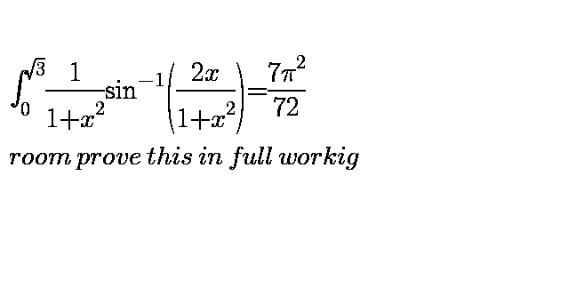
Question Number 106303 by mathdave last updated on 04/Aug/20

Answered by mathmax by abdo last updated on 05/Aug/20
![A =∫_0 ^(√3) (1/(1+x^2 ))arcsin(((2x)/(1+x^2 )))dx wedo the changement x =tan((t/2)) ⇒ A =∫_0 ^((2π)/3) (t/(1+tan^2 ((t/2)))) ×(1/2)(1+tan^2 ((t/2)))dt =(1/2) ∫_0 ^((2π)/3) t dt =(1/2)[(t^2 /2)]_0 ^((2π)/3) =(1/4)(((2π)/3))^2 =(1/4).(4/9) π^2 =(π^2 /9)](Q106523.png)
$$\mathrm{A}\:=\int_{\mathrm{0}} ^{\sqrt{\mathrm{3}}} \frac{\mathrm{1}}{\mathrm{1}+\mathrm{x}^{\mathrm{2}} }\mathrm{arcsin}\left(\frac{\mathrm{2x}}{\mathrm{1}+\mathrm{x}^{\mathrm{2}} }\right)\mathrm{dx}\:\:\mathrm{wedo}\:\mathrm{the}\:\mathrm{changement}\:\mathrm{x}\:=\mathrm{tan}\left(\frac{\mathrm{t}}{\mathrm{2}}\right) \\ $$$$\Rightarrow\:\mathrm{A}\:=\int_{\mathrm{0}} ^{\frac{\mathrm{2}\pi}{\mathrm{3}}} \:\:\frac{\mathrm{t}}{\mathrm{1}+\mathrm{tan}^{\mathrm{2}} \left(\frac{\mathrm{t}}{\mathrm{2}}\right)}\:×\frac{\mathrm{1}}{\mathrm{2}}\left(\mathrm{1}+\mathrm{tan}^{\mathrm{2}} \left(\frac{\mathrm{t}}{\mathrm{2}}\right)\right)\mathrm{dt} \\ $$$$=\frac{\mathrm{1}}{\mathrm{2}}\:\int_{\mathrm{0}} ^{\frac{\mathrm{2}\pi}{\mathrm{3}}} \mathrm{t}\:\mathrm{dt}\:=\frac{\mathrm{1}}{\mathrm{2}}\left[\frac{\mathrm{t}^{\mathrm{2}} }{\mathrm{2}}\right]_{\mathrm{0}} ^{\frac{\mathrm{2}\pi}{\mathrm{3}}} \:=\frac{\mathrm{1}}{\mathrm{4}}\left(\frac{\mathrm{2}\pi}{\mathrm{3}}\right)^{\mathrm{2}} \:=\frac{\mathrm{1}}{\mathrm{4}}.\frac{\mathrm{4}}{\mathrm{9}}\:\pi^{\mathrm{2}} \:=\frac{\pi^{\mathrm{2}} }{\mathrm{9}} \\ $$
